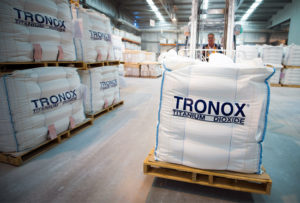The clamor over Stamford-based Tronox Ltd.”™s proposed $1.7 billion acquisition of the titanium dioxide (TiO2) business of a Saudi Arabian company is continuing, as the U.S. Federal Trade Commission has filed a complaint against Tronox in the U.S. District Court in the District of Columbia.
 The complaint alleges that Tronox’s deal for the TiO2 business of Cristal would violate antitrust laws by significantly reducing competition in the North American market for chloride-process TiO2.
The complaint alleges that Tronox’s deal for the TiO2 business of Cristal would violate antitrust laws by significantly reducing competition in the North American market for chloride-process TiO2.
The FTC’s decision to file the complaint came less than a week after global mining and inorganic chemicals company Tronox received conditional approval from the European Commission for the Cristal acquisition. The EC’s approval is conditional only on Tronox divesting a paper-laminate grade of TiO2, which the Stamford firm said it “is expeditiously seeking to complete.”
Tronox sued the FTC in January over its opposition to the deal, maintaining that the FTC was trying to prevent the transaction not through the ordinary litigation process in federal court, but by using its administrative process to run out the clock until the transaction agreement expired.
Jeffry N. Quinn, the firm”™s president and CEO, said he welcomed the commission”™s complaint.
“For months, we have urged the FTC to follow its ordinary procedure to determine the merits of the acquisition, the same procedure the Department of Justice uses for challenging unconsummated acquisitions and mergers,” Quinn said. “Instead, the FTC chose to challenge our transaction in a Part 3 Procedure before the FTC’s Administrative Law Judge, which would not result in a timely decision.
“Even so,” he continued, “during the Part 3 Procedure, I believe we convincingly demonstrated that the FTC’s objections to the Cristal transaction are entirely misplaced and that the transaction will benefit consumers through significantly increased production of TiO2 and efficiencies arising from our post-merger increased vertical integration.
“We now look forward to our long-awaited day in court and the opportunity to demonstrate how this transaction will benefit customers throughout North America and around the world,” Quinn concluded.





















